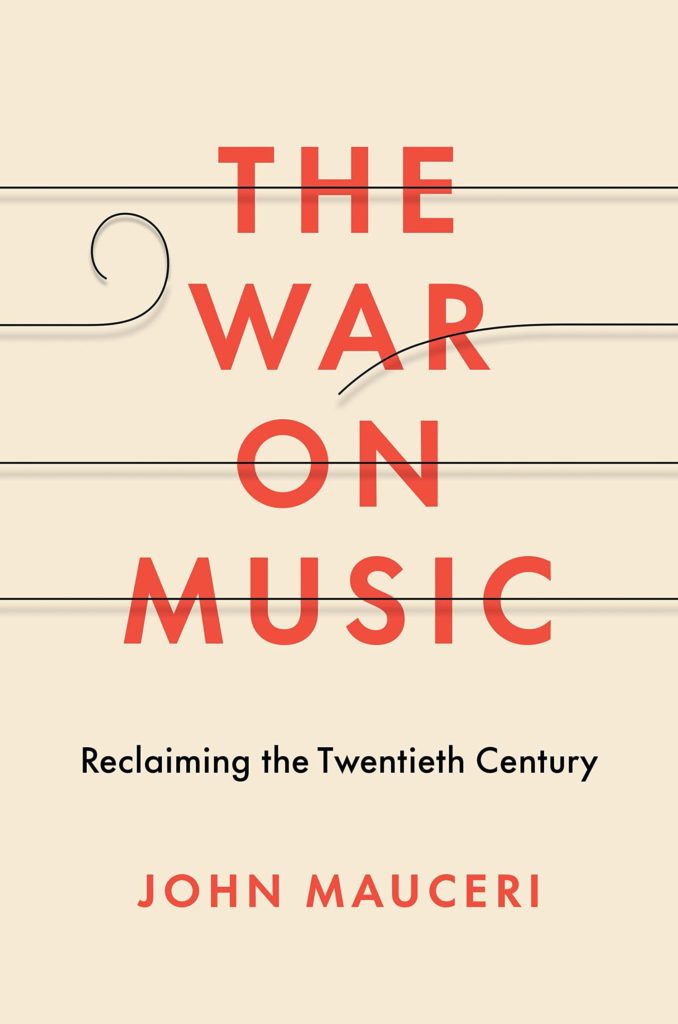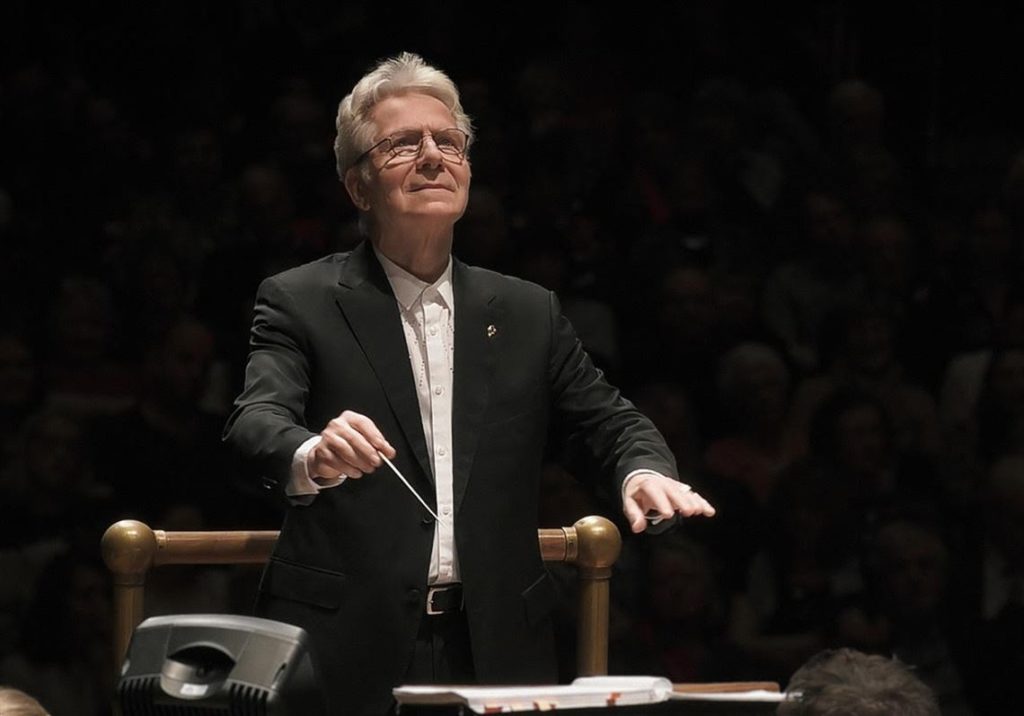

John Mauceri is a conductor and served on the Yale University faculty for 15 years. Mauceri believes the dearth of classical music in the 20th Century was the result of war. The Nazis banned plenty of music and only authorized certain approved conductors and certain approved music be performed.
Stalin insisted that music must have a purpose in supporting the State. Both Stalin and Hitler’s actions sent many talented conductors, classical musicians, and composers to other countries. In the United States, many of the refugee composers found their way to Hollywood.
For much of the 20th Century, Mauceri shows film music was considered inferior to “Real Classical Music.” But, as time has passed, the film music of Korngold, Steiner, Tiomkin, and Rozsa grow in fame and popularity. Mauceri maps out the classical influences that contemporary film composers work with:
“However, it can be argued that, if there is indeed a ‘line’ of influence, one that accounts for the most heard symphonic music in history, that like would look something like: Wagner–Strauss/Mahler–Korngold/Steiner (Waxman, Tiomkin, Rozsa)–John Williams (Elmer Bernstein, Alex North, Bernard Herman, Jerry Goldsmith)–Howard Shore, Danny Elfman, Hans Zimmer, Alexandre Desalt, Nobuo Uematsu, Ramin Djawadi, and so on.” (p. 153-154)
If you’re a fan of film music, you’ll appreciate Mauceri’s survey of Hollywood music of the 20th Century. What’s your favorite Hollywood music composer? GRADE: A
Table of Contents:
Introduction 1
1 A View from 30,000 Feet 14
2 Brahms and Wagner: The Twilight of Two Gods 25
3 Stravinsky and Schoenberg: Overtures to the Great War 37
4 The Lure of Chaos 62
5 Hitler, Wagner, and the Poison from Within 73
6 Stalin and Mussolini Make Music 81
7 The Miracle of a Second Exodus 95
8 A New War, an Old Avant-Garde 114
9 A Cold War Defines Contemporary Music 128
10 Creating History and Erasing History 149
11 Of War and Loss 173
12 A Century Ends 180
Appendix: A Personal Diary 195
Notes 207
Acknowledgments 217
Index 219
Illustrations follow page 36
I like a lot of the early & mid-20th century film music, especially Steiner, Rozsa, Tiomkin, and (later) Hermann (always to be remembered for “Psycho”). And I love all that flowery, romantic music from 1940s & 1950s films, even if it borders on cloying. I remember how excited I was when I first saw “Animal House” and saw Elmer Bernstein wrote the score! And I always feel a little pinch of pride when I see my long-ago secret husband, Danny Elfman, has become a grand old man of film music (we’ll forgo mention of his connections to Scientology).
Deb, I listen to a lot of film music, too. As Mauceri points out, Hitler and the Nazis caused many composers–Steiner, Rozsa, and Hermann–to flee Germany. Many of them ended up in Hollywood.
Morricone always stands out for me. I saw American Graffiti yesterday on a big screen. Not a single new piece of music in it but it was terrific hearing those fifties and early sixties songs.
Patti, I have dozens of movie soundtracks like AMERICAN GRAFFITI with great pop songs from that era! The music really enhances the film.
I’m with Patti. Morricone comes to mind first when I think of film music..
Steve, I break out my Morricone CDs on a regular basis. “The Good, The Bad, and The Ugly” theme song gets me every time!
Test.
The best Morricone western score remains FOR A FEW DOLLARS MORE…took his lessons from scoring A FISTFUL OF DOLLARS and really turned out a brilliant score that THE GOOD echoes well, but doesn’t match. Having one whole piece resolve to musical locket chimes was brilliant enough by itself.
Todd, you probably won’t be surprised to learn I have soundtracks to FOR A FEW DOLLARS MORE, A FISTFUL OF DOLLARS, AND THE GOOD, THE BAD, AND THE UGLY. Plus a few more Morricone CDs.
I’d definitely agree with Morricone and Bernard Herrmann as my favorites but, honestly, I don’t pay much attention to film scores. One that really stands out for me is John Carpenter’s incredibly creepy tinkling piano in HALLOWEEN.
Michael, I’ll have to dig out my soundtrack to HALLOWEEN and listen to that creepy tinkling piano again!
Carpenter enjoyed scoring about as much as directing, I gather.
Todd, some directors understand the impact of music in a film more than others.
And some have some talent in music others know they lack.
Remarkably foolish that Hugo Montenegro’s inferior recording of the GOOD main theme was the hit in the US.
Todd, I have Hugo Montenegro’s CD of Western theme music. It sold well and has remained popular over the years.
I hated FOREST GUMP but it has a terrific score of ’60s and ’70s music. We have many soundtracks too.
Deb, I remember when we were kids listening to my father’s records of stuff like MUSIC FROM MILLION DOLLAR MOVIES, which included the “Warsaw Concerto” and others from the ’40s.
Jeff, I love the FORREST GUMP soundtrack! So many great songs on that 2-CD set!
My folks actually laid out small money for 101 Strings albums sometime in the early/mid ’60s, so that’s where I first heard the “Warsaw Concerto”..ten years later, or a little less.
Todd, same here. My parents loved Broadway musicals and bought soundtrack albums. Mancini, Ray Coniff, and others who specialized in “Easy Listening” music found their way onto our family stereo.
I surpised Barry Malzberg a year or three back by noting how much mid-century scores for western films, of the more serious and epic sorts, such as THE BIG COUNTRY, owed to Holst and paticularly “Jupiter, Bringer of Jollity” from THE PLANETS.
Among my other favorite score composers not yet cited are Lalo Schifrin (and not solely MISSION: IMPOSSIBLE–he’s been a busy man thus) and a number of the other jazz crossover composers…Universal in the ’70s had scads on retainer, wrote a post about how many contributed at least some music to NIGHT GALLERY alone. (Of my posts with music video clips added, that was one of the if not the post most riddled with Videos Removed from YouTube due to copyright claims and the like.)
Todd, I’m a fan of Lalo Schifrin who did a great job with the music for DIRTY HARRY.
Classical and film music are my two great loves and have been since childhood so this looks like it’s right up my alley.
I wasn’t around in the mid-century but I have the strong impression classical music was much more embraced by middle America then. The national radio networks all had their own orchestras and regularly ran classical performances. Many, if not most, public schools had extensive music programs with an emphasis on classical and most film scores were, as you noted, essentially classical music (even Disney and Warner Brothers leaned heavily on classical music for their cartoon scores). By the end of the fifties/early sixties Leonard Bernstein, Oscar Levant, Van Cliburn and Glenn Gould all had pop star level stardom.
The subsequent implosion of the classical genre in the mainstream consciousness in the later sixties was likely a perfect storm of the radical decline in music education, the boomer’s embrace of the suddenly “hipper,” more counter culture rock and the classical establishment’s maniacal embrace of serialism and other more “difficult” music that alienated vast swaths of the existing and potential future audience. (Korngold, who was widely considered the next Mozart in the early 20th century, was a laughing stock when he quit Hollywood and returned to European concert halls after WW II. For some decades the closest thing most people heard approximating classical music was in the film scores of John Williams, Alex North, Jerry Goldsmith and James Horner. Classical music’s regrettable embrace of those horrid crossover albums in the 80s and 90s did nothing to help.
Things have improved significantly in recent years though. There’s a whole new generation of composers, conductors and musicians who seem genuinely free of the elitism that plagued their predecessors and are eager to reach out to potential new listeners. Film music is much more appreciated and Korngold is having a tremendous reappraisal with multiple acclaimed recordings of his work now released yearly while John Williams has been also been enjoying a renaissance with two highly praised recordings (one featuring Yo-Yo Ma and the other Anne-Sophie Mutter) just in the past year.
I envy you living in Buffalo where JoAnn Faletta and the Buffalo Philharmonic have established themselves as probably the most significant conductor/orchestra in the country if not the world for championing new composers and their music while also rescuing largely forgotten but enormously important composers of the past century from obscurity.
Byron, Diane and I love what JoAnn Faletta has done with the Buffalo Philharmonic Orchestra! We have been supporters of the BPO for decades. The musical choices for their concerts remain exceptional!
Sounds, so o write, good…and heirs to the Louisville Symphony hus?
I have to watch my Ts on this keyboard.
Bernard Herrmann, absolutely. Though I have a soft spot for Rozsa, mainly for his neo-Elgarian score for Private Life of Sherlock Holmes – the best thing about that film. Herrmann is notable also as the subject of one of the great Hollywood anecdotes. At a H’wood cocktail party a bunch of score composers were telling stories & gossiping and one said about Herrmann, “You know, Benny is his own worst enemy.”, and somebody in the group came right back with, “Not while I’m alive!”
Art, great story! Clearly Bernard Herrmann was a favorite of Hitchcock.
I should have mentioned that I encountered that Herrmann story in Andre Previn’s wonderful book, No Minor Chords, a memoire of his years working in Hollywood – a must read for anyone interested in the Golden Age film music.
Art, I’ve ordered NO MINOR CHORDS and you’ll see a review of it sometime soon. Thanks for the recommendation!